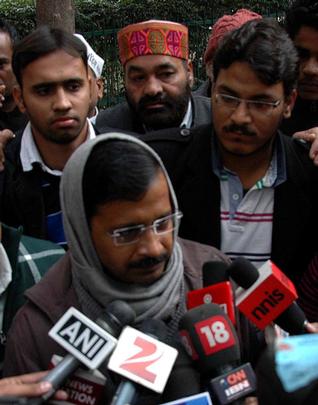Ghaziabad, December 30, 2013: After ending the VIP culture in the capital, the Arvind Kejriwal-led Delhi government on Monday fulfilled another big promise, announcing 666 litres of free water every day to each household with functional water meters. It amounts to 34 buckets of water per family of five every day.
The announcement was made by the newly appointed Chief Executive Officer of the Delhi Jal Board, Vijay Kumar, at a press conference in front of Mr. Kejriwal’s residence at Kaushambi in Ghazaibad.
20 kilolitres of water
Mr. Vijay Kumar later told reporters: “All domestic consumers having metered connection will get 20 kilolitres of water a month free of cost, starting January 1. We will not even levy any existing charges, such as water cess and sewerage charge. But, if the consumption limit crosses 20 kilolitres, the consumer will have to pay for the total water and other charges.”
At present, consumers pay Rs. 200 for 20 kilolitre a month.
Defending the big decision, Mr. Kejriwal tweeted immediately after the announcement was made: “It is the duty of any responsible government to provide ‘lifeline water’ to its citizens. We may debate the quantum but can we argue against the principle?”




1 Comment
Overwhelming Demands ?
You bet !
Looking at the crowds shouting their demands outside Arvind Kejriwal’s residence , you would think , people of Delhi have unlimited arrears of problems
Individuals and groups are trooping in from far and wide , demanding :
> Better physical services ( Power / Water / Homes / Transport )
> Jobs ( Permanency / Removal of Contract System / New jobs )
> Reservations / Abolitions / Implementations / Resignations
> Admissions / Legalizations / Transfers / Rise in Auto fares
> Roll back of CNG Prices / Reduction of Vegetable prices
> Security / Loans / Pensions
The list goes on and on
Only problem
Whereas demands are ” Unlimited ” , resources ( Manpower + Money + Systems ) are ” Limited ” !
Hence Arvind will need to evolve a simple method to evaluate the ” IMPORTANCE ” and the ” URGENCY ” of these demands
He may want to devise an online form or , like last time , print and distribute 50 lakh forms , which only need to be ticked , as in a multiple choice questionnaire
Then , on a scale of 1- 5 , invite people of Delhi to score each demand on the following criteria :
How does this problem affect ?
> Economic Status ( Rich / Middle Class / Poor )
> Geographic Coverage ( Posh Area / Middle class locality / Slums )
> Gender ( Male / Female / Both )
> Age ( Old people / Middle Age / Children )
> Coverage ( Entire population / Majority / One Community only )
> Nature ( Political / Social / Economic )
> Character ( Establish Equity / Reduce Disparity / Speed up Justice )
> Scope ( Job Creation / Health / Education / Corruption Removal )
> Time Frame ( Crisis Situation / Urgent / Can wait )
Then display the demands in the descending order of ” PERCENTILE SCORES ” – so people get to know what will get attended to and when
For AAP , with its inclination for seeking people’s opinion through ” STRUCTURED STATISTICAL SURVEYS ” , devising such a transparent and easily understood ” PROCESS ” , cannot be a big deal
Incidentally , no individual problem / demand should be included in the survey
Carrying out such a pilot , ” SOCIO – ECONOMIC – POLITICAL ” experiment can take our democracy to the grass-root level and give the people a sense of participation in solving their own problems
At the same time , people will be made aware that ,
> Resources are limited
> All demands cannot be attended simultaneously
> Injustice of past 15 years cannot be undone in the next 15 days
* hemen parekh ( 31 Dec 2013 / Mumbai )